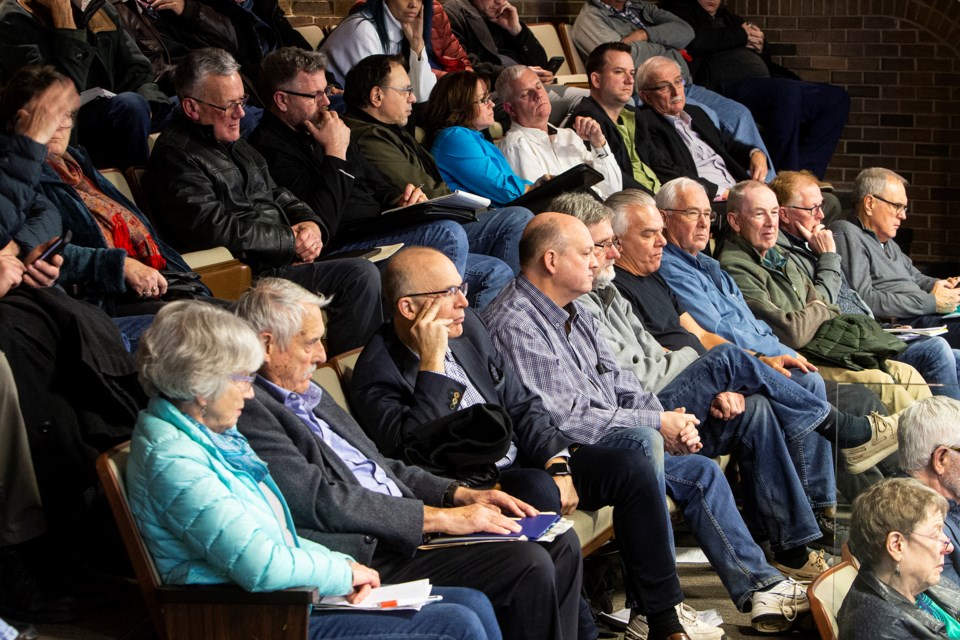There was standing room only for a public hearing in council chambers at St. Albert Place Monday, as residents came out swinging or expressed grave concerns against a proposal for a municipal utility corporation.
Ten of the people who attended made presentations to council, most of whom spoke expressly against St. Albert forming an arms-length corporation to absorb current utility services and expand into new lines of business. More than 50 people watched the four-hour public hearing from the council chambers gallery.
“I’m just hearing a very, very, very sketchy business case that’s got more holes in it than you can imagine. I’m very concerned and scared of this,” said Chris Casey.
Some residents suggested the question of a utility corporation should be put to the public in the form of a plebiscite during the next municipal election.
For many residents, impact on taxes and utility rates were top of mind. While the city has maintained there would be no impact on rates to current customers, some who spoke argued numbers in a business case drawn up by third-party consultant Grant Thornton do not seem to support that claim.
Andy Keller said the case’s income statement shows the income solely from new services does not come close to covering the administrative cost of running the corporation.
“If new services generate operating income of only $280,000 per year, it’s not a huge leap to assume that to cover the corporation’s spending and dividend payments to the city, utility rates will have to increase,” Keller said.
City staff stressed even though the proposed corporation would be controlled by an independent board of directors, city council would remain in control of setting utility rates.
Other residents pointed out many successful municipal utility corporations in Alberta have access to bountiful natural resources such as water and natural gas, which St. Albert does not.
An administrative report on comparable communities used Chestermere as one of three case studies, which multiple residents noted omitted relevant details on the corporation shuttering its doors earlier this year after years of ballooning utility rates and with over $35 million in accumulated debt.
Former city councillor Bob Russell said the same issues that “brought down” Chestmere’s MUC apply to St. Albert, since Chestermere did not have access to natural resources either.
The administrative backgrounder said the MUC focused on “status quo” services without considering a diversified revenue portfolio. St. Albert’s case for an MUC does look to expand into new services, although income from those new services is small.
Another case study used by St. Albert is Grande Prairie’s regional MUC, Aquatera.
Mike Killick pointed out that MUC has a “big cash cow” in the form of a supply of water, which produces the majority of Aquatera’s revenue.
“The only cash cow we have in St. Albert if the (MUC) does not work is the residents and businesses of St. Albert, which will suffer higher utility rate and franchise fees, or taxes,” he said.
One local business owner who spoke in favour of the MUC was excited about the possibility of partnering with St. Albert on a solar farm venture. EcoCharge president Steve Manchuk said he would work with St. Albert, whether it was through an MUC or the city’s existing utility structure.
Another consideration of switching to a corporation model is transparency. James Burrows said the great thing about running utilites out of the city is any resident can appear before council and have a say on the cost of utilities.
“By having what you’re proposing, or administration is proposing, I think that takes away that ability as taxpayers to reaffirm them – what we’re getting for service is what we think we should be paying for,” he said.
Two presenters, including Russell, both suggested the MUC question should be put to all St. Albert residents in the form of a ballot question during the 2021 municipal election.
Resident Edward Harding cautioned city council should have their eyes tuned to the concerns of the public.
“Everything I’ve heard here tonight sounds to be opposed to this corporation, and I think you people need to take that to heart and listen to what your residents are saying,” Harding said.
After closing the public hearing, city council deferred a decision on the utility corporation to their Dec. 16 meeting.




